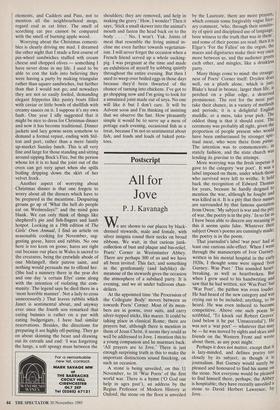Postscript
All for Jove
P. J. Kavanagh
e are shown to our places by black- dressed stewards, male and female, with silver insignia round their necks on broad ribbons. We wait, in that curious junk- collection of bust and plaque and bas-relief, Poets Corner in Westminster Abbey. There are perhaps 300 of us and we have all been invited. This fact, and something in the gentlemanly (and ladylike) de- meanour of the stewards gives the occasion the atmosphere of a subdued party. It is evening,, and we sit under ballroom chan- deliers.
At the appointed time 'the Procession of the Collegiate Body' moves between us towards Poets' Corner. Most of its mem- bers are in gowns, over suits, and carry silver-topped sticks, like maces. It could be taking place in classical Rome; there are prayers but, although there is mention in them of Jesus Christ, it seems they could as well be addressed to Jove. I mention this to a young companion and he murmurs back: 'All prayers are to Jove.' There is just enough surprising truth in this to make the important distinctions sound finicking, on such an occasion.
A stone is being unveiled, on this 11 November, to 16 `War Poets' of the first world war. There is a hymn CO God our help in ages past'), an address by the Regius Professor of Modern History at Oxford, the stone on the floor is unveiled by the Laureate, there are more prayers, which contain some forgivably vague liter- ary comment, 'who, through their sensitiv- ity of spirit and disciplined use of language,' bore witness to the truth that was in them., and some of their poems are read; then it is Elgar's 'For the Fallen' on the organ, the maces and dignitaries make their way once more between us, and the audience greets each other, and mingles, like a drinkless party.
Many things come to mind: the strange- ness of Poets' Corner itself: Dryden does t well, on a plinth alone, which isjus; Blake's head in bronze, larger than life, is perched on a pillar edge, a deserved prominence. The rest for the most pad take their chance, in a variety of methods and periods; it is a delightful English muddle, or a mess, take your pick. The oddest thing is that it should exist. The ceremony was probably all right, given the proportion of people present who would have been embarrassed by stronger spir- itual meat, who were there from pietas. The intention was to commemorate, in stately fashion, and the state church was lending its gravitas to the attempt. More worrying was the fresh impetus it gave to the category 'war poet'. It was a label imposed on them, under which those who survived were left to writhe. It held back the recognition of Edward Thomas for years, because he hardly deigned to mention the war, although he fought and was killed in it. It is a pity that their names are surrounded by that famous quotation from Owen: 'My subject is war and the pity of war, the poetry is in the pity.' In so far as I have been able to discern any meaning in this it seems quite false. Whatever their subject Owen's poems are cunningly made; the poetry is in the poem. That journalist's label 'war poet' had at least one curious side-effect. When I went through the manuscripts of Ivor GurneY, written in his mental hospital in the earlY 1920s, I thought some were signed 'Ivor Gurney. Was Poet.' This sounded heart- breaking, as well as heartbroken. Bat when I grew used to his handwriting and saw that he had written, not 'Was Poet' but 'War Poet', the pathos was even louder. He had heard of the new category and was crying out to be included; anything, to be heard. He was even induced to become competitive. Above one such poem he scribbled, 'To knock out Robert Graves' (and below it he put `Unsuccessful'). He was not a 'war poet' — whatever that may be — he was moved by sights and skies and friends on the Western Front and wrote about them, as any poet might. Perhaps it does not matter, except that it is lazy-minded, and defines poetry too closely by its subject, as though it is journalism. But Gurney would surely he pleased and honoured to find his name on the stone. Not everyone would be pleased to find himself there, perhaps; the Abbey is hospitable; they have recently unveiled a stone to David Herbert Lawrence, by Jove.


























































 Previous page
Previous page